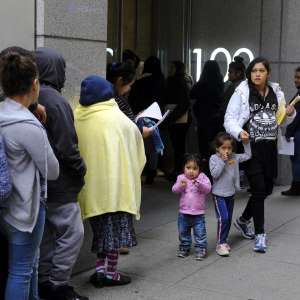
Two Democratic-led California counties asked a federal court on Wednesday to immediately block the Trump administration’s so-called “public charge” regulation, saying fearful immigrants in their diverse communities are foregoing essential health and social benefits as a direct result of the rule’s scheduled implementation in October.
In a new filing in their legal challenge to the controversial proposal by U.S. Citizenship and Immigration Services (USCIS), the populous counties of Santa Clara and San Francisco are hoping to convince the U.S. District Court of Northern California to issue an preliminary injunction by demonstrating that the regulation is already inflicting “irreparable harm” to their residents.
“If this rule would go into effect, you can’t the undo the damage of people who are not going to be accessing public health services, not going to be accessing needed governmental services or programs,” James Williams, counsel for Santa Clara County, told CBS News on Wednesday. “That damage can’t be undone and that’s why the rule needs to be blocked now.”
If the injunction is granted, the rule’s scheduled implementation in mid-October would be put on hold while the legal challenge — one of many mounted by immigrant rights groups and Democratic-led jurisdictions — makes it way through the courts.
The two counties included in their joint filing sworn testimonies from public health and social services officials who have witnessed and documented a drop-off in the services they provide because of fear over the rule.
Santa Clara County health officer Sara Cody said many newcomers and immigrants in her community find it difficult to distinguish between the federal government and state and local governments. Because of this, she said staff in the different county-run programs have reported a “general fear” among immigrants who worry that using any benefits will jeopardize their immigration cases or those of their families.
“As locals, we have to spend extra resources on outreach and education so people will not stop accessing services,” Cody said, adding that the federal government should be helping local jurisdictions quell confusion and fear through public information campaigns.
For Cody, another pressing concern about the rule is the detrimental effect she believes it will have on her county’s ability to control and manage communicable diseases like tuberculosis and HIV/AIDS. She said her county has already documented anecdotal reports of some immigrants with communicable diseases forgoing locally administered medical initiatives like the Ryan White Program for people living with HIV.
“When someone doesn’t come in and access care for tuberculosis because they’re worried about compromising their immigration status, it not only impacts their own health if they don’t get appropriate care for their infection, but it also poses a risk to the community,” she said.
The “public charge” proposal — pushed for more than two years by President Trump and immigration hardliners in his administration — would make it easier for the government to reject applications for green cards and temporary visas filed by legal immigrants who use certain benefits or whom authorities determine will rely on welfare programs in the future.
Currently, immigration caseworkers ask green card applicants to prove they won’t be a burden on the country. The new regulation, however, would dramatically expand the definition of the “public charge” term — first codified in U.S. immigration law in the late 19th century — by broadening the type and amount of benefits that count against immigrants seeking to stay or move to the U.S.
The new regulation would require caseworkers to consider the use of government housing, food and medical assistance such as the widely used Section 8 housing vouchers and the Supplemental Nutrition Assistance Program (SNAP), also known as food stamps.
The rule would subject immigrant households who fall below certain income thresholds to the “public charge” test, which would also gauge how well applicants speak, read and write English. Any diagnosed medical condition that requires extensive medical treatment would also “weigh heavily” in evaluations by caseworkers.
Asylum-seekers and refugees would be exempt from this “public charge” test, which administration officials said would affect about 382,000 people every year.
While the administration has strongly defended the proposal as a move to foster “self-sufficiency” among immigrants, Democrats and immigrants advocates have been scathing in their opposition to the rule, saying it will harm and punish immigrants, and some of their U.S. citizen children, for having a low income.
The rule would affect immigrants in the U.S. who are not citizens or permanent residents — as well as people seeking to come to the country from abroad — but researchers have already detailed a “spillover effect” in which both green card holders and U.S. citizens reported avoiding public benefits because of the proposal’s expected implementation.
*story by CBS News